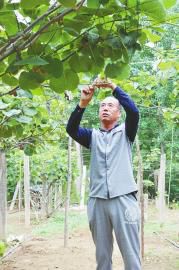Planting of traditional Chinese Medicine in Liwa Village, Nanwu Village opens up a new way to become rich
In the west of Liwa Village, Nanwucun Town, Jizhou City, a large area of green crops attracted people's attention. it is understood that this is the village to change the planting concept and introduce more than 500 mu of traditional Chinese medicine village-Atractylodes macrocephala and Polygonum multiflorum.
Liwa Village, Nanwu Village is a typical agricultural village, where farmers mainly grow traditional crops such as wheat, corn and cotton. In recent years, with the continuous decline of grain prices, farmers do not increase their income by farming, the disadvantages of the traditional planting model are beginning to show, and many farmers are confused about the direction of planting. Seeing this, Zhang, secretary of the village branch, and his party came up with the idea of finding new ways for farmers to get rich. he actively changed his way of thinking and, with the help of technicians in the agricultural sector, aimed at the cultivation of traditional Chinese medicine.
Although he was born as a farmer, the cultivation of traditional Chinese medicine is still a stranger to Zhang and his party. In order to understand the market, he alone came to Bozhou, one of the four major pharmaceutical capitals in China, and stayed for more than half a month. Every day, he went to the fields and went to the market with the big herbal growers to understand the planting technology and the market situation. After some investigation, he strengthened his determination and confidence in planting traditional Chinese medicine village. At the end of 2015, he bought the seedlings of Polygonum multiflorum from Bozhou and the roots of Atractylodes macrocephala from Anguo, collected the land of several brothers, transferred more than 300 mu of land, planted them all in the village of traditional Chinese medicine, and became the first person in the village to eat crabs.
Due to the lack of mastery of planting techniques and management essentials, there were many planting problems in the first year, and the low temperature at that time led to the low survival rate of Polygonum multiflorum seedlings, and the early injection of herbicides after the emergence of Atractylodes macrocephala Koidz seedlings, which led to problems in the growth of seedlings. He was overwhelmed with questions one by one, and whenever his brothers sighed, he always comforted him and said, "there is no hurry. We are in the first year, and we will regard it as groping for experience for the common people. In the future, they will not make mistakes like ours."
The problems were remedied one by one and the technology was mastered little by little. Zhang and his entourage insisted that he wanted to blaze a new path, a new way to increase people's income and become rich. under their meticulous service, the growth of medicinal materials is getting better and better day by day. They also set up a professional cooperative for the cultivation of Changhe medicinal materials. A few days ago, under the contact of the city's Agriculture and Animal Husbandry Bureau, several experts and professors from Hebei Agricultural University came to Liwa Village to learn about the growth of traditional Chinese medicine and provide technical guidance on the spot. a detailed explanation was given from the key links such as planting spacing, pest and pest control, heat preservation and humidity control, and deep pine fertilization, and brought a video of the whole planting technology of Atractylodes macrocephala Koidz. They also plan to use Liwa Village as a practical base for the cultivation of traditional Chinese medicine at Hebei Agricultural University. On the basis of experimenting with planting more traditional Chinese medicine villages, they will provide technical support for the cultivation of traditional Chinese medicine villages in Liwa Village, encourage more farmers to plant traditional Chinese medicine villages, and build a planting base for traditional Chinese medicine villages.
- Prev

Don't plant corn, plant Artemisia annua, don't be afraid of wild boar for reimbursement.
Don't plant corn, plant Artemisia annua, don't be afraid of wild boar for reimbursement.
- Next

The little kiwifruit chanted "the Sutra of getting Rich".
The little kiwifruit chanted "the Sutra of getting Rich".
Related
- A course of planting techniques and methods on how to grow carrots
- How to plant the latest tulips?
- Is it better to pick tea in the morning or in the afternoon? When is the best time for tea to be picked? what is the third or fifth tea?
- Launch Yuanxiao Happy combination Haocha + Tea Yuan healthy Taste
- Penghu Tourism "Fireworks 20 Parade with You"
- 2022 West Lake Happiness holds "Digital Revitalization Voucher" and draws iphone13 and laptop.
- Banqiao Fuzhou social houses are designed to change start-up combined with police elimination to create a safe and livable environment
- The convenient measure of "mechanical weeding" in Xinbei has been abused and the Agriculture Bureau has imposed heavy penalties on the illegal land consolidation.
- Changgeng University Joins Hands with Four Memory Factories to Rescue Memory Talent Shortage
- The list of Taiwan's top 100 MVP managers is listed by the Director-General of the Farmers' Association of Sanxia District.

